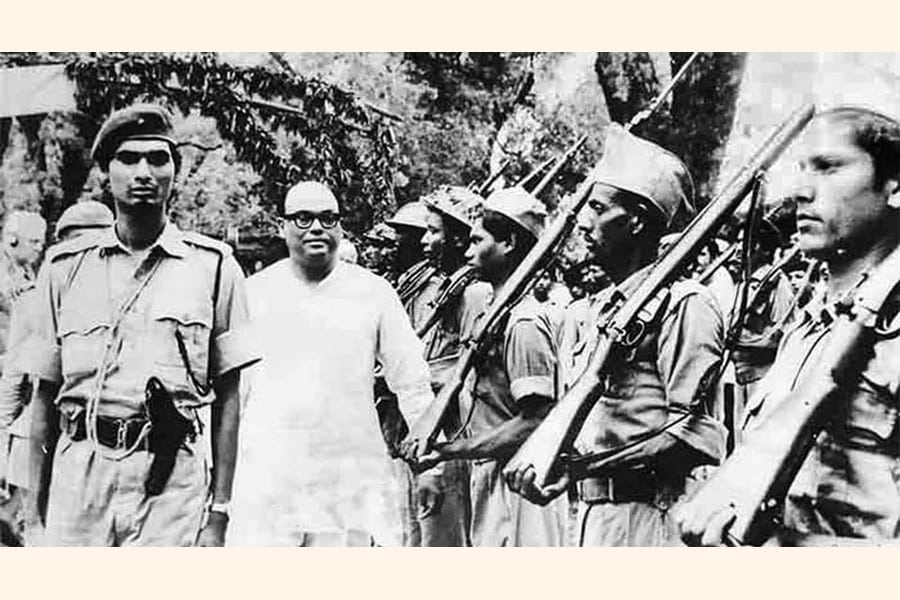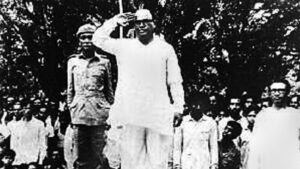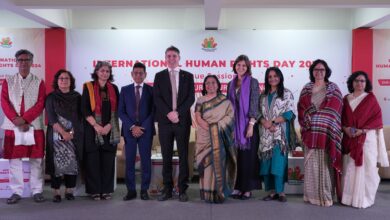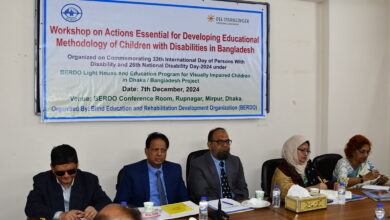Mujibnagar: The first government of independent Bangladesh
First Milestone of 'Bangladesh'

The first official government of the People’s Republic of Bangladesh, popularly known as the Mujibnagar Government, was formed on April 10, 1971. The newly formed government took oath on 17th April, 1971 in the then Meherpur district. The venue of the oath was a mango forest in Baidyantala which was renamed by the provisional government.
The formation of the Mujibnagar government and its pronouncement to the world at large on April 17, 1971, is really a red-letter event in our national history, especially after the thumping victory of the Awami League in the elections of 1970 under the leadership of Bangabandhu Sheikh Mujibur Rahman.

The Mujibnagar government was formed at the Baidyanathtala mango grove of Meherpur, a former Subdivision of Kustia district following the April 10 proclamation of independence order of Bangladesh. The oath-taking was witnessed by hundreds of foreign journalists who had assembled there to hail the birth of a new nation.
The president of the new nation was Bangabandhu Sheikh Mujibur Rahman; Syed Nazrul Islam became the acting president in the absence of Bangabandhu; Tajuddin Ahmed, the Prime Minister; M. Mansur Ali, the Finance Minister; M. Quamruz Zaman, the Home, Relief and Rehabilitation Minister; and Khandakar Mustaque Ahmed, Foreign Affairs and Law Minister. General M. A. G. Osmani, a retired colonel and MNA elected from Awami League, was made the C-in-C of the Bangladesh armed forces.
Earlier, several provisional governments were formed in different countries around the world to fight for independence. For example, during the Second World War, an independent French government was formed that was led by Charles the Gaulle. The headquarters of the independent Cambodian government, led by Prince Norodom Sihanouk was in Beijing. The headquarters of Afghanistan’s Mojahideen government was in Peshawar, Pakistan. But the “Mujibnagar Government” was quite different from these governments.
The contribution “Mujibnagar Government” to Bangladesh was truly immeasurable because leading the whole nation in the midst of overwhelming hostility, gaining widespread public support and recognition for the country while setting up diplomatic missions, building strong resistance against the Pakistani military were really gigantic tasks.
A review of the history shows that, from 26th March to 16th December, the dynamic role played by Tajuddin Ahmed, a co-fighter of Bangabandhu Sheikh Mujibur Rahman was really commendable. The greatest achievement of Tajuddin Ahmed’s life was to lead the liberation war in the absence of Bangabandhu Sheikh Mujibur Rahman. Especially, in the formation of “Mujibnagar Government”, Tajuddin Ahmed played a significant role.
Bangabandhu Sheikh Mujibur Rahman was declared the president of the new government. Syed Nazrul Islam was given the charge of Vice-President and Tajuddin Ahmed was made the Prime Minister of that government. Syed Nazrul islam, the Vice President hoisted the National flag in absence of Bangabandhu Sheikh Mujibur Rahman. Professor Md. Yusuf Ali read out the announcement of independent Bangladesh at the oath taking ceremony.
Some local singers sang the National Anthem “Amar sonar Bangla, ami tomay valobashi”. The oath taking program was witnessed by a 10,000 strong crowd which included contingents of the EPR, Ansar and Freedom fighters. A press statement was issued after the inauguration of the government, where Tajuddin Ahmed said, “Bangladesh is at war. It has been given no choice but to secure its rights of self-determination through a national liberation struggle against the colonial oppression of West Pakistan. In the face of positive attempts by the government to distort the facts in a desperate attempt to cover up their war of genocide in Bangladesh, the world must be told the circumstances under which the peace-loving people of Bangladesh were driven to substitute armed struggle for parliamentary politics to realize the just aspirations of the people of Bangladesh….. In our struggle of survive we seek the friendship of all people, the big powers and the small…. We now appeal to the nations of the world for recognition and assistance both material and moral in our struggle for nationhood. Everyday this is delayed a thousand lives are lost and more of Bangladeshi vital assets are destroyed. In the name of Humanity act now and earn our undying friendship.”
A day after the program, the portfolio of the government was distributed among the members. The newly elected members of the government gave a broad outline of the new government’s mission, vision and objectives. It also promised to frame a constitution as early as possible. They firmly approved the declaration of independence made by Bangabandhu Sheikh Mujibur Rahman on March 26. The first diplomatic mission of Bangladesh was established in Calcutta, India to continue all sorts of political activities.
The main objectives of the government were to ensure the equality, human dignity and social justice for the people of Bangladesh. It needs to be mentioned that, in absence of our great leader Bangabandhu Sheikh Mujibur Rahman, it was a really difficult task to organize the civil administration. The government kept the unity of the general people irrespective of classes or professions including Armed Forces, Police & EPR. Moreover, Organizing the freedom fighters, training them while at the same time keeping their morale high were important tasks.
In order to ensure the supply of weapons needed for the freedom fighters, the Mujibnagar Government kept close contact with India. Prime Minister Tajuddin Ahmed gave a speech over the radio to motivate the freedom fighters where he said, “We are the descendants of Titumir and Surya Sen. We have the capability to remove this foreign enemy permanently from our country, just as we can sacrifice life for freedom.”
During the liberation war, the leaders of that government would give guidance to the people of this country. The provisional president and the Prime Minister would keep the whole country motivated through their speeches over the radio. Simultaneously to get international recognition and support, they took many diplomatic initiatives and contacted the United Nations, European countries, the USA, Russia and other powerful nations to mobilize public opinion in favor of the Mujibnagar government.
Finally, “Mujibnagar Government” was able to end the liberation war in a victory in nine month. In our liberation war, the role of the “Mujibnagar Government” was immeasurable. Despite various pressures and difficulties, “The Mujibnagar Government” worked ceaselessly. It provided a legal stand which received all sorts of support and assistance from the world community to carry on the armed struggle against the Pakistani military. As a result, an independent and sovereign Bangladesh was born in the map of the world. Undoubtedly, 17th April, the “Mujibnagar Day” is one of the brightest chapters of our liberation war.
It is that lighting of the candle in the dark we celebrate this morning. The men who built the edifice of Bengali resistance little knew before 25 March 1971 of the huge ordeal that lay ahead of them, the call of history which beckoned them. They were men whose belief in constitutional politics had been total and unequivocal. And yet these were the men on whose shoulders now devolved the responsibility of guiding a bewildered, frightened nation to freedom. They did the job marvellously well. They shaped a revolution that would put into the global political orbit the first sovereign Bengali republic in history.
On 17 April 1971, a nation was born anew, a dream was rekindled, a people rediscovered hope through reinventing themselves. History was about to be shaped anew.
Like International Mother Language day, Independence Day and Victory Day, Mujibnagar Day is also a significant occasion in our national life.





